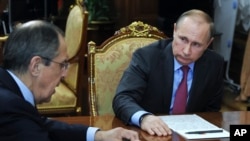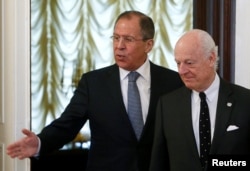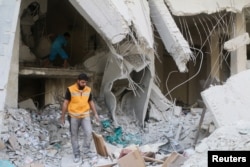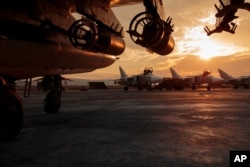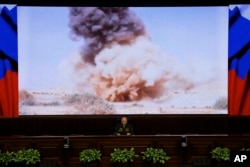As the United States and Russia struggle to cement a cease-fire in Syria that includes the embattled city of Aleppo, the Syrian military under President Bashar al-Assad indicated it would be a temporary extension.
Syrian rebels accuse Russia of using artillery to support the two-week assault. But while Assad clearly wants to conquer Aleppo, the largest city in Syria, Russian analysts say international prestige is the Kremlin’s main goal.
“Moscow is much more interested in the peace process, which keeps it in a unique position as a diplomatic co-equal with the U.S. than in Assad reconquering the other half of Aleppo,” says director of the Carnegie Moscow Center, Dmitri Trenin, in e-mailed comments to VOA.
“Russia's public optimism points to its interest to see the negotiating process back on track,” he adds.
Russia’s Foreign Minister Sergei Lavrov this week voiced hope for the cease-fire along with U.N. Special Envoy for Syria Staffan de Mistura, who met Monday in Geneva with U.S. Secretary of State John Kerry.
Lavrov touted the establishment of a joint Russia-U.S. monitoring center for the Syria truce, which he said the two countries militaries would discuss “face-to-face.” Kerry had described it in less grandiose terms as an increase in support staff.
“So far, by creating facts on the ground, Moscow has coerced Washington into a diplomatic tandem [Kerry-Lavrov] and even made the proud Pentagon, wary of potential casualties in case of a collision with Russian forces, talk to the MOD [Ministry of Defense],” says Trenin.
“Americans [particularly the military], however, accept this ‘partnership’ only reluctantly and grudgingly, minimizing its scope and importance,” he adds. “The Russians, for their part, seek to present their achievements in the field of cooperation with the U.S. in the best possible light: it gives them precisely the status that they seek,” Trenin concludes.
Syria campaign makes Russia indispensable
Weeks of intense Syrian airstrikes on Aleppo and artillery fire exchanged with rebels shredded a hard-won, cease-fire mediated in February by the U.S. and Russia.
Despite the truce covering only parts of Syria, and not including Aleppo, it was the best result of peace negotiations since Russia entered the five-year conflict last fall. On Wednesday U.S. and Russia said they brokered a localized cease-fire Aleppo.
Russian airstrikes not only supported Assad’s waning forces, but boosted their offensives to make gains on the ground, spurring the urgency of international efforts for peace talks.
Russia’s Syria campaign was also widely viewed as a cynical move by the Kremlin to get back on the world stage after more than a year of pariah status in the West over its annexation of Ukraine’s Crimean peninsula and military aggression.
"Obviously it changed the attitude of major Western interlocutors, including [the] United States, toward Russia and toward Mr. Putin,” says political analyst Victor Mizin of the Moscow State Institute of International Relations. “And so we saw a new dialogue, which has started with the role of Russia as indispensable actor or player in all those deliberations.”
Russia’s partial pull-out of its forces from Syria in March was seen by some analysts as a signal from Russian President Vladimir Putin letting Assad know who is in charge.
Russian military analyst Pavel Felgenhauer tells VOA Russia’s military backing of Assad is aimed at forcing the acceptance of his government remaining in power in some form, and remaining a client state of Russia, as the only political solution.
“Both parties... the warring factions are aiming at victory,” says Felgenhauer, “and that means the ultimate solution will be anyway military,” he concludes.
Russia's view on Syria 'cynical'
Complicating the situation are insurgent terrorist groups operating in and around Aleppo, like al-Qaida affiliate Jabhat al-Nusra-also known as the al-Nusra Front, who were not part of the truce. Fighting al-Nusra is the main reason Syrian forces, and their Russian backers, have given for the assault on Aleppo.
Russia’s Ministry of Defense on Wednesday blamed the delay in extending the truce to Aleppo on a hospital attack from a rebel-held area of the city. But while Kerry condemned that attack, Russia denied a Syrian air strike on a major Aleppo hospital last week even took place, despite dozens of reported casualties and condemnation by the United Nations, Western powers, and medical aid groups.
Meanwhile, Russia-implausibly and cynically-continues to deny responsibility for any civilian casualties, and state TV drums up support for the Syrian army by focusing on civilian casualties from insurgents.
After securing an agreement with Russia for a truce in Aleppo, Kerry urged the Syrian opposition forces the United States supports to halt their fighting and called for Moscow to demand the same from Assad.
But while Russia maintains considerable sway over Damascus, it is not clear how much leverage Moscow is willing to use to halt Assad’s ambition to conquer the city and re-take all of Syria.
“The Kremlin is more about Russia's global status than about Syria's future,” says Trenin. “Moscow is realistic about Syria and the Middle East, which means, realist and cynical,” he concludes.




